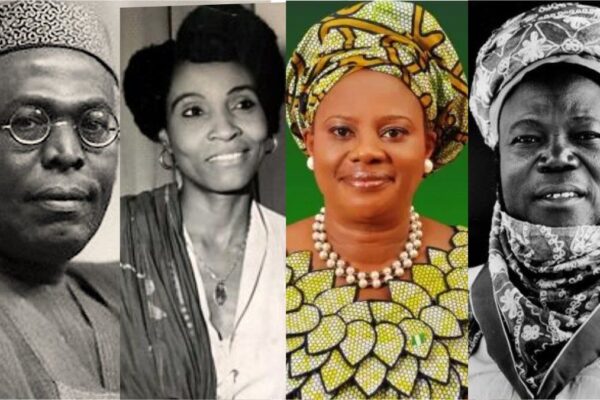The battle is set! All the political parties have conducted their primaries to elect their standard flagbearers for various elective posts ahead of the 2023 general elections. Now, the various candidates will begin the hard work of travelling the length and breadth of the country to interact with and convince Nigerians to vote for them. But for elections to be successfully conducted, laws must be implemented to make them rancour-free. This is where the Electoral Act of 2022 comes into play.
So, what is the Electoral Act 2022? What are its key provisions, and how does it contribute to the successful conduct of elections, especially the upcoming one in 2023?
What is the Electoral Act?
Before explaining what the electoral act is, readers need to understand the core activity that necessitates the act’s creation: election.
An election is a process by which the citizens of a state (countries) vote to elect their preferred people to represent their interests in an executive government or parliament. It is also a means through which citizens of a state reject those they perceive have not governed well or those they do not want to rule them.
Elections are one of the fundamental principles of democracy. Indeed, they are the basis of democracy as it is the conduct of periodic elections that distinguish a legitimately elected government from a dictatorship. According to the late Austin Ranney, a renowned American political scientist, elections are used to “establish popular control over public affairs” and “create popular support for leaders and policies” of the government.
Having understood what an election is, then what is the electoral act?
The Electoral Act is the extant electoral law guiding elections in a country. The electoral law is the main regulatory instrument containing all the laws that govern electoral processes. In virtually every country, the electoral law is an act of parliament.
ALSO READ: 2023: How to obtain PVC, vote in upcoming election
The Electoral Act, among other things, performs the following functions:
- Sets out the elements of the electoral system contained in a country’s constitution and the modalities for its application
- Defines the sphere of the regulations (which elections are affected by them)
- Outlines the type of suffrage adopted, regulations of the suffrage, and explanation about the deprival of rights
- States the regulations referring to the electoral system (constituency, number of representatives, electoral formula, etc.)
- Stipulates the criteria of who is eligible and who is ineligible, and the conditions for running as candidates
- Specifies the framework by which political parties may organize their internal government and how they conduct their primaries to elect/select candidates for elective offices
- Lists the regulations relevant to electoral administration (appointments, dependence or independence, procedures of operation, etc.)
- Provides the layout for electoral campaign regulations (campaign ethics on advertising and PR, timeline to conduct and halt campaigns, etc.)
- Sets forth the limit on political expenses and financing of elections, as well as the sources of campaign funds
- Delineates the voting procedures ((accreditation of voters, how voters should cast their vote, the mode of election and type of voting system, and timeframe for voting on election day), vote counting procedures, and the result declaration process
- Prescribes how the electoral management body can void an election
- Highlights who is eligible to file election petitions and the mechanism by which candidates and political parties can file their election petitions
- Lists what constitutes electoral offences and process to prosecute offenders
History of the Electoral Act in Nigeria’s Fourth Republic
The recently assented 2022 Electoral Act is the fourth electoral law to be passed by the National Assembly and assented to by a president since the country’s return to democracy in 1999.
Nigeria had three previous electoral acts in the fourth republic: 2002, 2006, and 2010. The Electoral Act 2022 repealed the 2010 Electoral Act, which was amended in 2010, 2011, and 2015, respectively. Therefore, the 2022 Electoral Act is an entirely new piece of legislation focusing on Nigeria’s electoral process and system.
The 2002 and 2006 electoral acts were assented to by the first president of this republic, Olusegun Obasanjo (1999-2007). On the other hand, the 2010 Electoral Act was signed into law by Goodluck Jonathan, the third president of this republic (2010-2015). Jonathan also signed into law the amendments in 2010, 2011, and 2015.
ALSO READ: 2023: How voter apathy affects elections in Nigeria, ways to tackle it
When was the 2022 Electoral Act signed into law?
The 2022 Electoral Act was signed into law by President Muhammadu Buhari. The President assented to the bill on 25 February 2022, after years of rejection. He had rejected that same bill a whopping five times from 2018 to 2021. The bill was rejected several times after he expressed his opposition to some of the clauses that the National Assembly proposed.
The 2022 Electoral Act will be the guiding regulation alongside the recently released electoral guidelines for the upcoming 2023 general elections. It has been largely lauded by President Buhari, the Independent National Electoral Commission (INEC), the electoral management body in Nigeria, political parties, civil society organisations, and the media because of some of the momentous innovations and the consequential directives contained in the…
Key provisions of the Electoral Act, 2022
The 2022 Electoral Act attempts to resolve some of the lingering issues that have questioned the integrity of previous elections in Nigeria. It also strives to protect and enhance the security of elections through the adoption of advanced/smart technologies.
These provisions in the electoral act are:
Section 3(3) and (4): Early and improved funding of INEC
Interpretation of 3(3): This section states that INEC must be properly financed to conduct its work, noting that funds needed to conduct general elections should be released to the commission at the latest 360 days (a year) to the stipulated time.
Interpretation of 3(4): Unlike previous general election years in which INEC would wait for the Ministry of Finance to vet its budget before getting the needed funds, INEC can now obtain the funds according to its stipulated process.
Section 8(5): Members of INEC must be apolitical
Interpretation: Anybody who is appointed to any position in INEC must not be a member of a political party. Such a person must identify his or her membership and then publicly renounce it before taking up the job. This is very important following the imbroglio that occurred in July 2021 following President Buhari’s nomination of Lauretta Onochie, one of his presidential media aides, who was discovered to be a member of the ruling All Progressives Congress (APC), as an INEC Commissioner to represent Delta State.
ALSO READ: Minimum wage in Nigeria, US, Europe, others
Section 9(1) and (2): Compilation of national voter register in manual and electronic format
Interpretation: INEC has always been empowered to compile and maintain a register of voters. However, the new inclusion is that the electoral umpire is now expected to compile and maintain the voters’ register in an electronic format. This is an acknowledgement by the piece of legislation of the changing times by adopting technology.
This section also catered to the needs to the needs of persons living with disability (PWD), as this section implicitly directs INEC to adequately plan for PWD registered to vote.
Section 28(1) and (2): Early publication of election date
Interpretation: INEC, according to this section, is expected to announce the date of general elections 360 days (a year) before it is due to be conducted. The electoral umpire is subsequently required to then publish the notice in all the constituencies where elections are to be held, as well as the place where the nomination papers are to be delivered.
Section 29(1): Timeline for submission of the name of approved candidates by political parties
Interpretation: As stipulated, all political parties must submit the name of their sponsored candidates by at least 180 days (six months) before the general elections are conducted. This provision will enable the majority of the post-primary litigations to be resolved ahead of the polls.
Section 33: Substitution of candidates by political parties
Interpretation: This section clearly states that political parties are not allowed to change the name of candidates for elective posts that they submit to INEC. The names can only be substituted in the event of the death or withdrawal of the candidate, and a new primary must be conducted within 14 days (two weeks) for the candidature change to be effected.
ALSO READ: All there is to know about June 12 in Nigeria’s history
Section 34(1) and (3): Fate of an election following the death of a candidate
Interpretation: Following the unexpected death of Abubakar Audu just after the conduct of the 2015 Kogi governorship election of the controversy that followed, this section of the Act addresses the gap. Under section 34(1) of this new act, in the event of the death of a candidate after the submission of names to the Commission, the INEC Chairman is empowered to cancel the election and announce a new date of the election within 14 days of the demise.
Also, if the candidate of a political party dies after the commencement of an election and before the announcement of the final result and declaration of a winner, INEC, according to section 34 (3), has the power to suspend the election for 21 days.
If the deceased candidate was a contestant for a seat in either the National Assembly or a state House of Assembly, the political party must conduct a fresh primary within 14 days of the demise of the candidate to get a new candidate. For the presidential, governorship election, or Federal Capital Territory Area Council election, the running mate of the deceased candidate automatically becomes the new candidate, and he or she must nominate a new running mate.
Section 41(1), 47(2) and (3) and 50(2): Adoption of technological devices for elections and electronic transmission of results
Interpretation: These aforementioned sections consist of, unarguably, the biggest innovation contained in this Act. There have been arguments for years about Nigeria following the global order by adopting and utilising technology to conduct her elections successfully.
Therefore, section 41(1) states that electronic voting machines and any other voting device (smartcard reader, the Bimodal Voter Accreditation System [BVAS], etc.) can be deployed by INEC to conduct an election. Section 47(2) goes further in stipulating that the presiding officer at a polling unit must use the smartcard reader or any other technological device approved by the commission to accredit voters on election day and verify their particulars. In addition, section 47(3) specifies that if the smartcard reader or any other device fails to function and that a new smartcard reader is not deployed, the election shall be cancelled and rescheduled within 24 hours.
Section 50(2) authorises INEC to transmit the results of the election via electronic means. This ultimately settles the dispute about the existence of the “INEC server,” as claimed by the opposition Peoples Democratic Party (PDP) during the 2019 presidential election.
Section 51(2) and (3): Cancellation of election results due to overvoting
Interpretation: Before the assent of the new Act, there was controversy over how overvoting was defined and the criterion for cancelling election results due to overvoting. Election results had been cancelled when the total number of votes cast at a polling unit on election day exceeds the total number of registered voters, in line with the 2010 electoral act.
But section 51(2) of the 2022 Electoral Act defines overvoting as the situation whereby the number of votes cast in a polling unit exceeds the total number of accredited voters on the day of the election in that polling unit. Therefore, once the number of votes cast surpasses the number of accredited voters in the polling units, the presiding officer is expected to cancel the result of that election.
Section 51(3) goes further to state that when the result for a polling unit is cancelled based on subsection 2 of this section, a return (result) shall not be made until a fresh election has been conducted in that polling unit.
ALSO READ: Local government areas in Nigeria: History, other information you may need
Section 54: Attention to visually impaired voters and those with special needs
Interpretation: As already mentioned above, section 9 highlights the need to maintain a register of persons living with disabilities to help INEC adequately prepare for the considerations in their set up of polling stations on election day.
Section 54(1) incorporates the need for PWDs one step higher by noting that any voter who is visually impaired (who cannot see) or is incapacitated due to a form of physical disability may be accompanied to the polling unit and, subsequently the voting cubicle by a person chosen by him or her to assist in voting. However, there is a caveat: the PWD must inform the presiding officer of his or her disability, as well as the presence of the guide.
Section 54(2) stipulates that INEC must help PWDs at polling centres to vote easily by providing a suitable means of communication such as braille, large embossed print, electronic devices, sign language interpretation, or off-site voting in appropriate cases.
Section 62(2): Compilation of election results electronically
Interpretation: This piece had earlier highlighted the introduction of the electronic transmission of results in section 50(2) of this Act. Section 62(2) opens a new venture by insisting that INEC shall compile, maintain and update a register of election results to be known as the National Electronic Register of Election Results.
The register, according to the provision, is expected to comprise a database of results from polling unit by polling unit results, as well as the results collated at the ward, local government, and state levels, as well as the federal level (in the case of a presidential election).
Section 65(1): Determination of election result declared under duress
Interpretation: This section stipulates that where an election result was not declared voluntarily, or it was declared against the provision of the electoral act and guidelines for the election, INEC can review such a result within seven days and make a final determination of the return.
This law was made to tackle a lacuna that was exposed. During the 2019 Imo West Senatorial district election, the election’s returning officer claimed that he declared the result under duress and resulted in a crisis for days before INEC decided to uphold the declared return.
Section 84(9) and (10): Agreement on a consensus candidate
Interpretation: In time past, reports have emerged of how candidates were foisted upon or imposed on party faithful in the name of “consensus.” Well, section 84(9) of this act has addressed the issue, informing political parties that whenever they adopt a consensus candidate, they must secure the written approval of all the cleared aspirants for that particular elective position. The approval letter of the aspirants must indicate that they stepped down voluntarily and also adopts the party’s consensus candidate.
If all the aspirants involved are unable to reach a consensus on the candidate, section 84(10) states that the political party must then organise a primary election to determine the candidate.
ALSO READ: Top 10 best states in Nigeria to live in
Section 88: Increase in the limitation of campaign and election expenses
Interpretation: Presidential candidates are now to spend not more than N5billion for their campaign, which represents a huge jack from the N1billion limit stated in the previous electoral act. A total of N1billion is now the new limit for gubernatorial candidates, while N100million and N70million, respectively, are the new limits for senatorial and House of Representatives candidates.
For state House of Assembly and local government chairmanship candidates, the maximum amount of election expenses is N30million. Councillors contesting for seats in local government areas are not to exceed the sum of N5million for their campaigns.
Section 94(1): Increase in time for campaigns
Interpretation: This law states that the period of campaigning in public by every political party shall commence 150 days (five months) before polling day and end 24 hours to the day of the election. This increases the time for public campaigns by political parties and their candidates from the 90 days specified in the repealed electoral act of 2010.
However, despite the aforementioned provisos lauded by all and sundry, the act is also replete with controversies. The contentious sections are:
Section 84(8): Exclusion of elected political office holders as statutory delegates in primaries
Interpretation: Section 84(8) states: “A political party that adopts the system of indirect primaries for the choice of its candidate shall clearly outline in its constitution and rule the procedure for the democratic election of delegates to vote at the convention, congress or meeting.”
In plain terms, this means that only persons elected to vote as delegates, as stipulated by a party’s constitution, can vote at the convention. The statutory delegates, which consist of elected political office holders, former presidents, and party chieftains, are not allowed to participate in such events.
Elected political office holders cannot be voted as party delegates because such action would mean that they have been voted to another position while serving their term, which is contrary to sections 138 and 183 of the 1999 constitution (as amended). For lawmakers, being elected as delegates would mean the immediate activation of sections 68(1)(e) and 109(1)(e) of the same constitution.
ALSO READ: 8 tips on how to start life in Nigeria
In the repealed 2010 electoral act, elected officials were permitted to vote as statutory delegates at primaries. However, while they were drafting the legislation and fighting over the inclusion of direct primaries as the main mode of candidates’ selection, the federal lawmakers “forgot” to include this proviso in the bill. According to Senator Ahmed Lawan, the Senate President, the non-inclusion of statutory delegates is a “deficiency that was never intended.”
The lawmakers hurriedly amended the Act by including the provision and transmitted it to President Buhari in May 2022 to assent to it just before the primaries for the 2023 general elections. However, he is yet to sign it into law as of the time of writing this piece.
Section 84(12): Barring political appointees as aspirants for party primaries and as delegates in conventions
Interpretation: This section prohibits all political appointees from presenting themselves as aspirants for elective posts during party primaries. It also bans them from being chosen as delegates to vote at conventions or congresses organised by political parties. Political appointees, in this case, are aides appointed by the president, governors, and local government chairmen (e.g., ministers, chief of staff, commissioners, heads of departments and agencies, advisers, and assistants). Political appointees must resign their appointment before they can be eligible to participate in the electoral process either as an aspirant or as a delegate.
This provision was deliberately inserted by members of the National Assembly to checkmate the powers of governors. In the Nigerian political system, the governors have a large grip over the structure of political parties and can, therefore, determine the fate of the current federal lawmakers on whether to re-contest for a new term or be pursued away. The lawmakers also consider the political appointees as a threat to their political survival, especially if they are backed by their principals to take over their National Assembly seats in upcoming election cycles.
In a similar vein, the political appointees are part of statutory delegates and since they are at the whims of the president or governors, they will likely vote according to the interests of their principals. This, therefore, affects lawmakers who are not in tandem with the president or their governors as the political appointees will not likely vote for competency, meritocracy, or popularity during primaries, especially if they (National Assembly members) are aspirants.
ALSO READ: All you need to know about the Coat of Arms of Nigeria








